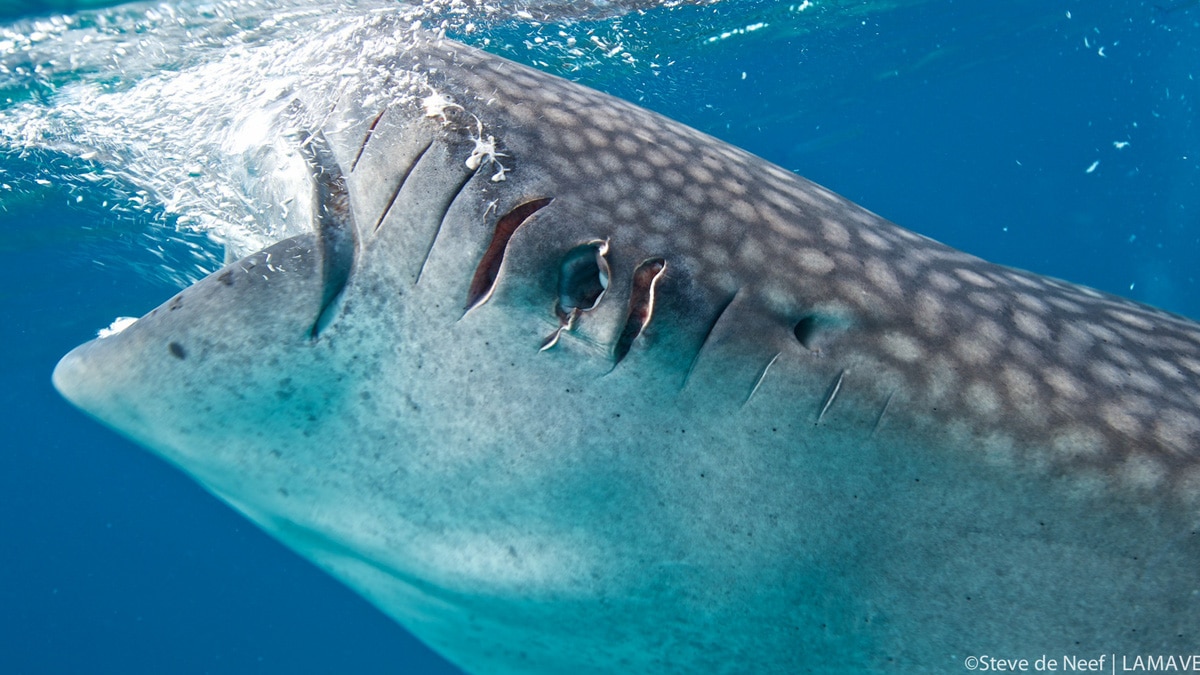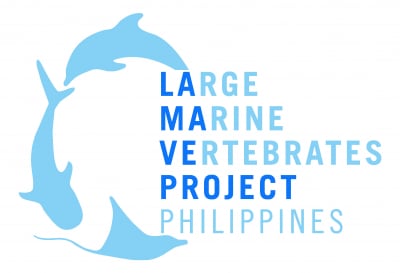Marine Life & Conservation
LAMAVE reports increased injuries on endangered whale sharks in Oslob

 A new study published by LAMAVE in the journal Aquatic Conservation, Marine and Freshwater Ecosystems presents the results of some of the work conducted since 2012 to assess the impacts of tourism activities on individual whale sharks in Oslob, Cebu.
A new study published by LAMAVE in the journal Aquatic Conservation, Marine and Freshwater Ecosystems presents the results of some of the work conducted since 2012 to assess the impacts of tourism activities on individual whale sharks in Oslob, Cebu.
The study found that individual whale sharks observed in barangay Tan-Awan, where the butanding are hand-fed daily to enable the tourism interactions, show a significantly higher number of injury, and scars than whale sharks in other non-provisioned (non-fed) tourism sites in Australia, Mozambique and the Seychelles. The study highlights the increased risk for these sharks that regularly visit the provisioning site in Oslob, and underline the urgent need to implement proper management interventions to guarantee the tourism activities do not harm these endangered animals.
The study presents results from photographic images of 152 individual whale sharks collected by the researchers from Large Marine Vertebrates Research Institute Philippines over a period of 34 months (March 2012 – January 2015) in Oslob, Cebu. The team used photo-identification (photo-ID) to monitor individual whale sharks’ presence and movement and gathered data on the presence, size, type and location of scars on the whole body of these gigantic animals as well as the accumulation of these scars over time. These scarring patterns of whale sharks in Oslob were compared with quantitative studies from Ningaloo in Australia, the Seychelles and Mozambique, other known global aggregations where feeding the whale shark is prohibited and enforced.
The study found that whale sharks in Oslob were significantly more scarred than any other studied population: 95% of all whale sharks in Oslob had scars on their body, with abrasion being the most common type of scar. Most of the scars were categorised as nicks and abrasions and were most likely due to the close contact of ropes, small boats at the provisioning site. Lacerations, which fall into the major category, were observed on 28% of individuals, which is significantly higher than in Ningaloo and Mozambique. These were caused by boat propellers of different sizes and could be facilitated both from the habituation to boats caused by the practice of hand-feeding the whale sharks, as well as the increased traffic of motorized vessels in the surroundings of the provisioning area.
Whale sharks that were observed more frequently in the interaction area showed a significantly higher rate of scarring compared to individual sharks that were seen less frequently in the area; these regular visitors to Oslob accumulated scars over the observation period and suggest a direct causal link between the exposure to the tourism activities in Barangay Tan-Awan and scarring rates. Scars and wounds, even when non-lethal, may pose a serious risk to these endangered species, increasing the physiological stress of the animals, facilitating the contraction of diseases carried by pathogens like virus and bacteria and decreasing overall the health of the affected individuals.

Scars on the head and mouth of a whale shark in Oslob, Cebu at different stages of inflammation and tissue reaction. These scars are caused by continuous contact and rubbing against hard surfaces like outriggers and boat hulls, and are similar to what observed in whale shark kept in captivity in aquaria. Credit: ©LAMAVE
“This study presents evidence of the negative physical impacts of the tourism activity on the whale sharks in Oslob. I have seen myself the wounds on these endangered and enigmatic animals; injuries which highlight the need for an urgent change in Oslob.” – Lead author Luke Penketh
Management solutions to reduce the physical impact of tourism on whale sharks
The high incidence of injuries in the whale sharks provisioned in Oslob is a national concern and there is an urgent need to improve management practices to protect this endangered species. The whale shark is protected by Republic Art No. 9147 ‘Wildlife Resources Conservation and Protection Act.’ whereby it is illegal to maltreat and/or inflict injuries on threatened wildlife, and this is further reinforced by the DOT-DA-DILG-DENR Joint Memorandum Circular no.01 series of 2020 (Sect. 8) where it prohibits acts in dedicated interactions sites that would hinder an animals’ health, including injury and distress. The Philippines is a signatory country to the UNEP Convention on Migratory Species (CMS), where the signatories agree and recommend the strict regulation, monitoring and enforcement of the whale shark tourism interaction activities to ensure its sustainable management and conservation value as highlighted in the Concerted Action for the Whale Shark (UNEP/CMS/Concerted Action 12.7, 2017).
The results highlighted in this study, when paired with the existing knowledge on the migratory nature of this species and connectivity between the archipelago, where individual whale sharks identified in Oslob have been re-sighted in Donsol (Sorsogon Region V) Sogod bay (Southern Leyte Region VIII), Tubbataba Reef Natural Park (Palawan Region VIa), Misamis Oriental (Region 10) and nationally connected further abroad to Malaysia, Indonesia and Taiwan, call the National Department of Tourism, Department of Environment and Natural Resources and the Department of Agriculture – in collaboration with the Department of Interior and Local Government to urgently intervene to ensure the sustainable management the tourism activities in the municipality of Oslob, as well as in other Regions, to ensure the long term balance between the socio-economic benefit of the local communities, the conservation of the marine environment and preservation of endangered protected species like the whale sharks.
For more information about the work of LAMAVE visit the website by clicking here.
Marine Life & Conservation
Double Bubble for Basking Sharks

 The Shark Trust is excited to announce that, for two more days only, all donations, large or small, will be doubled in the Big Give Green Match Fund!
The Shark Trust is excited to announce that, for two more days only, all donations, large or small, will be doubled in the Big Give Green Match Fund!
Donate to Basking in Nature: Sighting Giants
The Shark Trust is hoping to raise £10k which will be doubled to £20k. This will go towards Basking in Nature: Sighting Giants. And they need YOUR help to reach they’re goal.
The Shark Trust’s citizen science project is to monitor and assess basking sharks through sightings; encouraging data collection, community engagement, and promoting nature accessibility. This initiative aims to enhance health and wellbeing by fostering a deeper connection with British Sharks.
Campaign Aims
- Increase citizen science reporting of Basking Sharks and other shark sightings to help inform shark and ray conservation.
- Provide educational talks about the diverse range of sharks and rays in British waters and accessible identification guides!
- Create engaging and fun information panels on how to ID the amazing sharks and rays we have on our doorstep! These can be used on coastal paths around the Southwest. With activities and information on how you can make a difference for sharks and rays!
- Promote mental wellbeing through increasing time in nature and discovering the wonders beneath the waves!
Donate, and double your impact. Click Here
Marine Life & Conservation
Leading UK-based shark conservation charity, the Shark Trust, is delighted to announce tour operator Diverse Travel as a Corporate Patron

 Corporate Patrons provide a valuable boost to the work of The Shark Trust. The Trust team works globally to safeguard the future of sharks, and their close cousins, the skates and rays, engaging with a global network of scientists, policymakers, conservation professionals, businesses and supporters to further shark conservation.
Corporate Patrons provide a valuable boost to the work of The Shark Trust. The Trust team works globally to safeguard the future of sharks, and their close cousins, the skates and rays, engaging with a global network of scientists, policymakers, conservation professionals, businesses and supporters to further shark conservation.
Specialist tour operator Diverse Travel has operated since 2014 and is committed to offering its guests high quality, sustainable scuba diving holidays worldwide. Working together with the Shark Trust will enable both organisations to widen engagement and encourage divers and snorkellers to actively get involved in shark conservation.
“Sharks are truly at the heart of every diver and at Diverse Travel, we absolutely share that passion. There is nothing like seeing a shark in the wild – it’s a moment that stays with you forever!” says Holly Bredin, Sales & Marketing Manager, Diverse Travel.
“We’re delighted to celebrate our 10th year of business by becoming a Corporate Patron of the Shark Trust. This is an exciting partnership for Diverse and our guests. We will be donating on behalf of every person who books a holiday with us to contribute towards their vital shark conservation initiatives around the world. We will also be working together with the Trust to inspire divers, snorkellers and other travellers to take an active role – at home and abroad – in citizen science projects and other activities.”
Paul Cox, CEO of The Shark Trust, said:
“It’s an exciting partnership and we’re thrilled to be working with Diverse Travel to enable more divers and travellers to get involved with sharks and shark conservation. Sharks face considerable conservation challenges but, through collaboration and collective action, we can secure a brighter future for sharks and their ocean home. This new partnership takes us one more valuable step towards that goal.”
For more information about the Shark Trust visit their website here.
For more about Diverse Travel click here.
-

 News3 months ago
News3 months agoHone your underwater photography skills with Alphamarine Photography at Red Sea Diving Safari in March
-

 News3 months ago
News3 months agoCapturing Critters in Lembeh Underwater Photography Workshop 2024: Event Roundup
-

 Marine Life & Conservation Blogs3 months ago
Marine Life & Conservation Blogs3 months agoCreature Feature: Swell Sharks
-

 Blogs2 months ago
Blogs2 months agoMurex Resorts: Passport to Paradise!
-

 Blogs2 months ago
Blogs2 months agoDiver Discovering Whale Skeletons Beneath Ice Judged World’s Best Underwater Photograph
-

 Gear Reviews2 weeks ago
Gear Reviews2 weeks agoGEAR REVIEW – Revolutionising Diving Comfort: The Sharkskin T2 Chillproof Suit
-

 Marine Life & Conservation2 months ago
Marine Life & Conservation2 months agoSave the Manatee Club launches brand new webcams at Silver Springs State Park, Florida
-

 Gear Reviews3 months ago
Gear Reviews3 months agoGear Review: Oceanic+ Dive Housing for iPhone


















